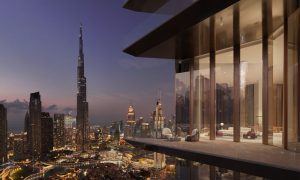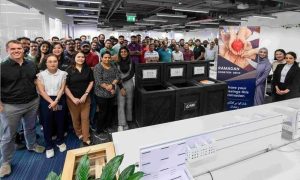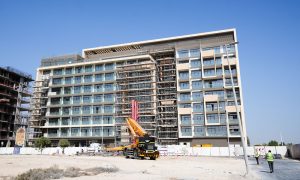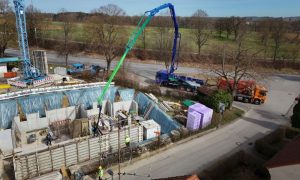Industry Talk: Talent and green technology top industry’s 2021 wish-list
According to a GlobalData report, the construction output growth forecast for the Middle East and North Africa region is set to contract by 4.5 percent in 2020, before recovering with a growth of 1.9 percent in 2021 and 4.1 percent in 2022.
The data and analytics company’s report explains that the 2020 contraction is a reflection of the severe impact of the COVID-19 lockdowns, as well as the other restrictions on construction activity.
“The construction sector will face headwinds in 2021 with a slow recovery, but the pace of recovery will be uneven across countries in the region. Throughout 2020, and running to 2021, spending on real estate megaprojects, especially in the GCC, is likely to take a backseat as a result of budget revisions,” Yasmine Ghozzi, economist at GlobalData, comments.
“The construction sector will face headwinds in 2021 with a slow recovery, but the pace of recovery will be uneven across countries in the region. Throughout 2020, and running to 2021, spending on real estate megaprojects, especially in the GCC, is likely to take a backseat as a result of budget revisions,” she adds.
For Saudi Arabia, GlobalData has slightly revised up its forecast for the Kingdom’s construction output to -1.9 percent from -2.8 percent, adding that it expects a recovery for the sector of 3.3 percent in 2021. This revision reflects an improvement in economic performance, the report adds – pointing out that the Public Investment Fund (PIF)’s investment of $40 billion (5 percent of GDP) per annum in the economy in 2021-2022 has underlined this recovery.
Although Globaldata maintains its forecast for construction output growth in the UAE of -4.8 percent, a rebound of 3.1 percent in 2021 is a promising medium-term outlook, Ghozzi says.
“The recent approval of a new Dubai Building Code is a positive development for the UAE. The new code outlines a revised set of construction rules and standards and seeks to reduce construction costs by streamlining building rules,” she explains.
The UAE is also proceeding with plans to expand its production capacity with Abu Dhabi National Oil Company (ADNOC) announcing its five-year investment plan worth US$122 billion, a move that is set to boost the construction sector further, particularly in the oil and gas sector.
The GlobalData report adds that the company has not changed its estimated growth rates for Qatar and Kuwait in 2020, at -4.5 percent and -9.5 percent, respectively. However, it has further cut the growth forecast for Oman to -10.3 percent from an earlier estimate of -8.1 percent, as the construction industry struggles with the challenges presented by the outbreak of COVID-19, low oil prices and the impact of sovereign credit rating downgrades.
“The new fiscal plan launched by the Omani Government to wean itself off its dependence on crude revenues through a series of projects and tax reforms is a good step which will aid the construction sector recovery in the medium term,” Ghozzi explains.
Clearly, as we move into 2021, there is a sense that the construction industry is beginning to find its feet again. Therefore, in order to get an on-the-ground insight into how the sector is shaping up, Big Project ME surveyed some of the leading construction companies in the region, asking them what they felt were some of the biggest challenges are in the year ahead, and how prepared the industry is for what lies ahead.
Mr Yu Tao, president and CEO, China State Construction Engineering Corporation Middle East
“In 2020, the outbreak of COVID-19 had a huge impact on UAE economy and especially the real estate and construction industries. The construction industry in the region has been undergoing multiple difficulties, such as the decrease of contract awards, the slowdown of industry growth and insufficient liquidity in the system. These challenges have made companies realise the importance of cash flow management.
This year, in 2021, although we are seeing some developments and projects which are active and in tendering stage, contractors are all eagerly aiming to win projects in 2021 to survive and maintain operational stableness. Hence, the competition intensity of 2021 could be as high as that of 2020, with both local and international contenders optimising their bids.
Players in the market are looking forward to, and having expectations for the year 2021, and what follows is the effort they put in, searching for any opportunity in the industry. The competitive environment will stimulate the recovery of the project market, but it will also exert a lot of pressure on contractors, subcontractors, and suppliers.
Given the fact that the price of construction materials and the shipping cost have soared from December last year, the cost and cashflow management will be crucial for all the contractors this year. At CSCEC ME, we will definitely be focusing on the quality and efficiency of the project delivery since we have more than 40 on-going projects in the Middle East region. Under the directives of the local government, we will also be closely following up government-led opportunities, and other large-scale strategic projects.
The market has experienced a sharp downturn due to the pandemic, low oil prices and the other adverse factors. However, we believe that because the world is together against the pandemic, our lives will get back to normal, with the bounce back of the economy and the construction market. We are currently remaining positive about the industry’s long-term recovery prospects and are trying to expand our regional operations in the Middle East. In recent years, driven by the National Transformation Program and the country’s Vision 2030, Saudi Arabia’s business environment has greatly improved, and more opportunities has emerged in that market.
The KSA market has evolved in an attractive and open way for both local international businesses. There are several launched and planned megaprojects that require contractors to be professional, efficient and at a high-standard. Developments such as NOEM, Diriyah Gate Development, Qiddiya, The Red Sea Development and others are all shaping the future of the country.























